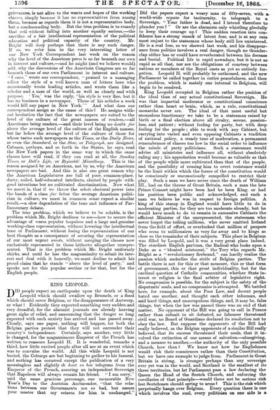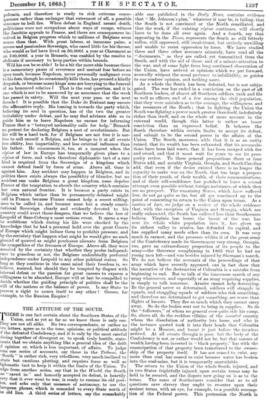KING LEOPOLD.
DID people expect an earthquake upon the death of King Leopold which should swallow up Brussels, or a flood which should cover Belgium, or the disappearance of Antwerp, or what ? Evidently they expected something very sadden and very dreadful, for the alarmist journals are already heaving great sighs of relief, and announcing that the danger so long expected with such anxiety has arrived and has passed away. Clearly, says one paper, nothing will happen, for both the Belgian parties protest that they will not surrender their country's independence. Certainly, says another, very little is changed, for the magnanimous Emperor of the French has written to reassure Leopold II. It is wonderful, remarks a third, how little excited people after all are at an event which was to convulse the world. All this while Leopold is not buried, the Coburgs are but beginning to gather to his funeral, and nothing has occurred except the publication of a very meaningless and slightly de haut en bas telegram from the Emperor of the French, assuring an independent Sovereign that Napoleon will always remain his friend. "I am sorry," said the same gracious personage, one memorable New Year's Day to the Austrian Ambassador, "that the rela- tions between our Governments are so bad, but assure your master that my esteem for him, is unchanged." Did the papers expect a weary man of fifty-seven, with a. world-wide repute for taciturnity, to telegraph to a Sovereign, "Your father is dead, and I intend therefore to- plunder you ? " Or are the alarmists only whistling gleefully to keep their courage up-? This sudden reaction into con- fidence has.a strong smack of latent fear, and is at any rate- most unjust to the statesman whose body still lies uninterred. He is a real loss, as we showed last week, and his disappear- ance from politics involves a real danger, though no thunder- clap either has or could have reverberated between his decease and burial. Political life is rapid nowadays, but it is not so. rapid as all that, nor are the obligations of courtesy between nations or members of the Royal caste as yet so entirely for- gotten. Leopold H. will probably be enthroned, and the new- Parliament be called together in entire peacefulness, and then the problem, which is mainly one internal to Belgium, will begin to be resolved.
King Leopold occupied in Belgium rather the position of the ideal than of any actual constitutional Sovereign. He- wes that impartial moderator or constitutional conscience rather than heart or brain, which, as a rule, constitutional monarchs never are. The ideal of that most useful but anomalous functionary we take to be a statesman raised by birth or a final election above all rivalry, serene, passion- less, and patient ; without feeling for party, but with deep, feeling for the people ; able to work with any Cabinet, but carrying into varied and even opposing Cabinets a tradition of national policy, a steady tone of moderation, a permanent . remembrance of classes too low in the social order to influence the minds of party politicians. Such a statesman would advise all ministries and influence all, without absolutely ruling any ; his approbation would become as valuable as that of the people while more cultivated than that of the people, and the possibility of rousing him to overt resistance would be the limit within which the forces of the constitution would. be consciously or unconsciously compelled to restrict their play. Such a man we have never since the death of William DI., had on the throne of Great Britain, such a man the late Prince Consort might have been had he been Sing, or had his position been public and acknowledged, and such a man we believe he was in respect to foreign politics. A king of this stamp in England would have little to do in moderating parties, for they are too moderate already, but he would have much to do to remain in successive Cabinets the- efficient Minister of the unrepresented, the statesman who nimier forgot the toiling millions, who never omitted Ireland from the field of effort, or overlooked that million of paupers- who seem to millionaires so very far away and to kings as close as the remainder of their subjects. This place in Belgium was filled by Leopold, and it was a very great place indeed. The sturdiest English partizan, the Radical who looks upon a Duke as a "bloated aristocrat," the Tory Who regards Mr. Bright as a " revolutionary firebrand," can hardly realize the passion which underlies the strife of Belgian parties. The battle there is not for this or that measure, this or that form of government, this or that great individuality, but for the- cardinal question of Catholic communities, whether State in- terest or religion is the final arbiter of legislative right. No compromise is possible, for the subject is the safety of the disputants' souls, and no compromise is attempted. We battled here, for example, about the Poor Law, and decent people' hated one another, and thought each other inhuman, and said hard things, and unscrupulous things, and, it may be, false things, but when the law was passed there was an end of that matter. No opponent of the Bill was going to call in France- rather than submit to sit defeated, no labourer threatened civil war, no Board of Guardians declared its resolution not to obey the law. But suppose the opponents of the Bill had really believed, as the Belgian opponents of a similar Bill really believed, that its success threatened their souls, that it in- volved the extinction of one means of salvation—almsgiving, and a menace to another,—the authority of the only possible Church, how then ? We know not how far Englishmen would risk their consciences rather than their Constitution, but we have one example to judge from. Parliament in Great- Britain is strong, is stronger perhaps than any sovereign ever yet was in the world, and Scotland is the smallest of its. three territories, but let Parliament pass a law declaring the Queen the Head of the Scotch Church, and enforcing the corollaries of that principle—would there not be serious risk lest Scotchmen should spring to arms? This is the risk which perpetually hangs over Belgium. Every question there is one which involves the soul, every politician on one aide is a polemic, and therefore is ready to risk extreme conse- quences rather than endanger that extremest of all, a possible sentence to hell fire. When defeat in England meant death, politicians were not scrupulous about ways of escape, witness the Jacobite appeals to France, and there are consequences in- volved in Belgian progress which to millions of Belgians seem worse than that. With great labour, at immense pains, a serene and passionless Sovereign, who cared little for his throne, who would as lief have lived on 50,000/. a year at Claremont as on 100,0001. a year in Brussels, was enabled by the resolve to abdicate if necessary to keep parties within bounds.
Will his son be so able? Is he a bit the more able because there is a momentary pause of reverence and mutual fear before an open tomb, because Napoleon, never personally malignant even to his foes, though he occasionallykills them, has penned a kindly despatch, or because many kings' sons are hurrying to the funeral of an honoured relative ? That is the real question, and it is one which is not to be answered by an assurance that the week has passed in safety. Will the next year pass, or the next decade ? It is possible that the Duke de Brabant may ensure the affirmative reply. His leaning is towards the party which, believing its soul in question, has of the two the greater irritability under defeat, and he may find advisers able so to guide him as to leave Napoleon no excuse for informing France that a "betrayed nationality calls for help," Bismark no pretext for declaring Belgium a nest of revolutionists. But his will be a hard task, for if Belgians are not free it is use- less to call oneself a Belgian, and he brings to it at all events less ability, less impartiality, and less external influence than his father. He commences it, too, at a moment when the regime of law in Europe has temporarily given place to a re'gime of force, and when therefore diplomatic tact of a rare kind is required from the Sovereign of a kingdom which cannot defend itself by force of arms. Above all, time is against him. Any accident may happen in Belgium, and in politics there exists always the possibility of blunder, but no accident can make Belgium a great kingdom, none deprive France of the temptation to absorb the country which contains her own natural frontier. It is because a party exists in Belgium which rather than be permanently defeated might call in France, because France cannot help a secret willing- ness to be called in, and because none but a steady consti- tutional Sovereign clearly and evidently devoted to his country could avert those dangers, that we believe the loss of Leopold of Saxe-Coburg a most serious event. It opens a way to ambitions which during his life were checked by the knowledge that he had a personal hold over the great Courts of Europe which might induce them to prohibit pressure, and by the certainty that happen what might he would give no such ground of quarrel as might perchance alienate from Belgium the sympathies of the freemen of Europe. Above all, they were arrested by the certainty that whether they prefer independ- ence to grandeur or not, the Belgians undoubtedly preferred independence under Leopold to any other political status. So long as they continue in the same mind their freedom is, we believe, assured, but should they be tempted by disgust with internal defeat or the passion for great careers to express a willingness to be absorbed, Europe will at last be compelled to decide whether the guiding principle of politics shall be the will of the nations or the balance of power. Is any State to possess a right to annex itself to any other ? Greece, for example, to the Russian Empire ?



































 Previous page
Previous page